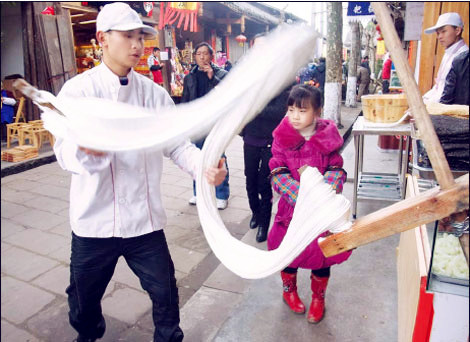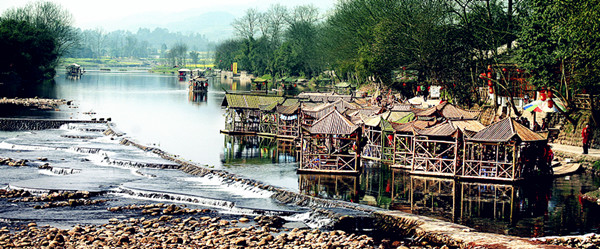

 |
|
A sugar store assistant tries to attract attention by twisting and kneading a lump of sugar. Chen Liang / China Daily |
 |
But that's the charm of Pingle, there's the present and there's plenty to back its claim of antiquity. Founded sometime around 150 BC, Pingle has retained the impressions of the several eras it has lived through.
Strolling down Qilong Street, for instance, you can drop by an old-style smithy. The jovial owner, who claims this is a 300-year-old family business, will demonstrate how to work up a big fire in the hearth by pumping the bellows. He might even allow you to have a go at hammering the pieces of smoldering soft iron on the anvil, if he is in the mood.
Not too far away is a maiden cheerfully twisting and kneading a lump of lily-white sugar roughly the size of her own diminutive figure, to get an even consistency. The final product, she insists, helps one get rid of a stubborn cold.
Across the river, on the north bank, is the sprawling Tiangong Yingwu Garden and house, which belonged to a patrician in the 1930s. The thresholds leading to the unroofed inner courtyard are unusually high, an indicator of his high rank. Inside, past the bright red drapes adorning the doorframes are quaint frog-mouth-shaped containers to hold and filter rainwater.
The farm space has a printing press, calligraphy center and a brewery (now defunct, but the equipment is preserved for the sake of historicity). An unused red satin-draped sedan stands on the edge of what used to be an expansive, circular performance/meeting space, waiting for the warmth of human touch.
Further north is Lugou bamboo forest. It's easy to get bogged down by the never-ending groves of reeds that seem to reach for the skies, looking down on the thin stream, cutting and meandering through the rocky terrain.
One pedestrian bridge across the river is just a series of unevenly sawed wooden planks, each suspended by a pair of rather flimsy-looking ropes. If you have ever wondered what it's like on a flying trapeze, this could be your chance to check it out.
A little deeper into the forest - or bamboo sea, as it is aptly called, what with the towering reeds reflected in the water beneath, creating an intense fluid canvas - lies a paper-making mill from the Song Dynasty (960-1279).
The elaborate contraption has not been used for a long time, as evidenced by the thick patina of moss. But it's not difficult to see how the mechanism worked, propelled by power generated by the water mill. Huge vats, in which the bamboo would have been shredded and beaten to a pulp, have been lying empty for ages.
Pingle life is somewhat laid-back but Xinxing street, running almost horizontally across the town, is immensely colorful.
A shallow canal, less than two meters wide, runs right through its middle, punctuated by quaint bridges with intricate carvings on them. A primitive husking stone attached to a rotating lever, rests under a pagoda roof. A giant water wheel, nestling among the weeds, leads to a pool bordered by lavenders, peonies and bluebells.
The street's southern half is a celebration of food. Small mountains of tofu - balls, cubes and slices, coated in a range of nerve-numbing red, orange and yellow ochre sauces - are heaped in steel basins, selling at 8 yuan ($1.21) a jar (500 grams).

In China, most giant pandas live in the mountains of Qinling, Minshan, Qionglai, Daxiangling and Xiaoxiangling.

By the end of 2011, the number of wild giant pandas in the world was about 1,590.